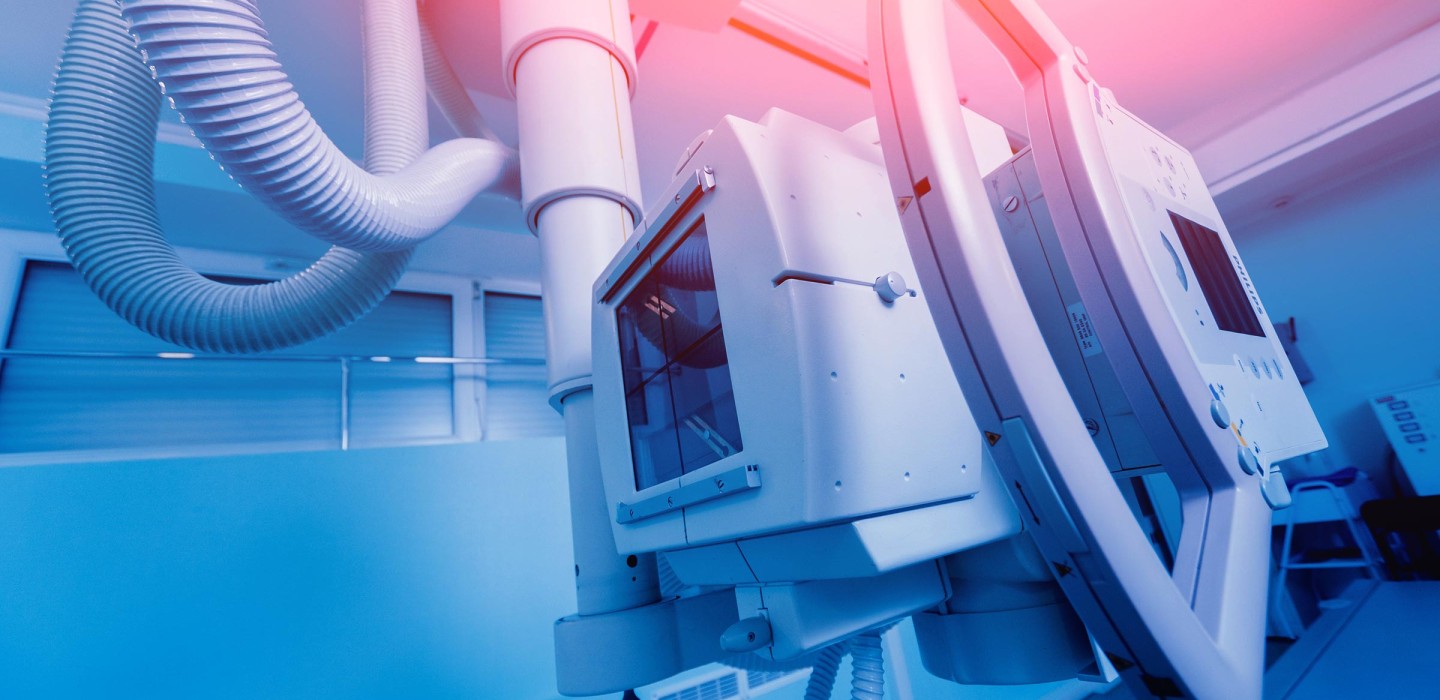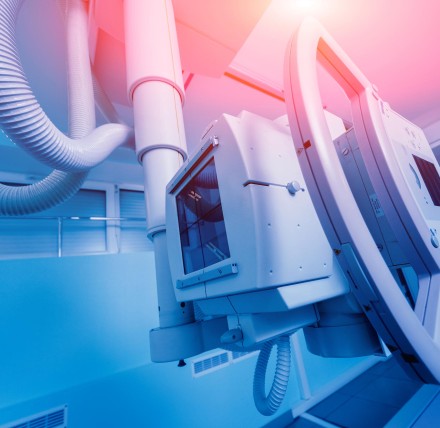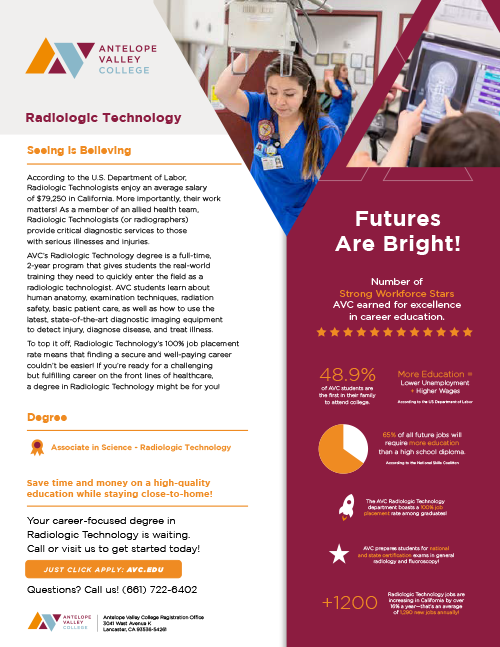Enrollment
- Prerequisites for the Radiologic Technology Program are: Completion of BIOL 201 (General Human Anatomy – 4 units), BIOL 202 (General Human Physiology – 4 units) CHEM 101 (Introductory Chemistry – 5 units), MATH 115 (Statistics - 4 units) and ENGL 101 (Academic Composition - 3 units) at Antelope Valley College or the equivalent at another accredited college. All science courses require a lab. Students are also required to meet the following prerequisites: minimum GPA of 2.0 for all college courses taken; minimum GPA of 2.0 for BIOL 101, BIOL 201, BIOL 202, CHEM 101, English 101, and Math 115
- Counseling WILL NOT schedule students for an educational planning and evaluation of transcripts two weeks from the application deadline. Please do not wait until the last minute to schedule this appointment if you are trying to apply by the deadline.
What to know before you apply:
-
Beginning January 1, 2026, the Health and Safety Sciences Office will no longer accept physical applications. This process will be online only.
-
You must sit with an AVC counselor and receive a completed educational plan. ( All pre-requisite courses must be completed. All substitutions/equivalencies must be approved. Any courses noted as in progress or pending approval will disqualify your application). This form is required to apply. You will be prompted to upload a copy when submitting your application.
-
Counseling WILL NOT schedule students for an educational planning and evaluation of transcripts two weeks from the application deadline. Please do not wait until the last minute to schedule this appointment if you are trying to apply by the deadline.
-
If you are trying to receive additional points for work experience, volunteer hours, or personal experiences, please download and correctly complete the appropriate forms to upload with your application. You will not get credit for these items if you do not upload the appropriate forms.
-
We no longer will accept physical transcripts and will only accept official electronic ones. This means you will have to request them through your institution or parchment. We will only accept transcripts during the application period. We will not accept ANY electronic transcripts directly from the student. They must come from the official institution. All required courses must be completed, we will not accept any noted as "In progress". If you are trying to receive credit for a degree, it must be posted on your transcript. We do not accept diplomas.
-
You will have to send transcripts from ALL colleges where pre-requisite courses were completed INCLUDING AVC. If you did not take any courses that apply to this program at AVC, you will only send from institutions where relevant coursework was completed. The link to purchase your electronic transcript from AVC only is noted below. Transcripts must be sent to healthsciences@avc.edu during the application period. The Division office will not accept any transcripts sent before the application begins or after it ends.
-
If you attended high school or college outside of the United States and would like to use those courses for credit, you will have to have your transcripts evaluated by a NACES approved agency and have those submitted to us electronically.
-
Only submit ONE application. Submitting multiple does not make the chances of acceptance higher but will make the screening process take longer.
-
You must have an AVC email address in order to complete the online application. If you are having issues with your email, please contact ITS at help@avc.edu
-
Once you submit, keep a copy of the response email informing you it has been submitted. Technical difficulties can occur. This is your proof that you submitted within the application window.
Please note, we will not accept any documents (forms, transcripts, educational plans etc.) before the application period begins or after it has closed. Any items received outside the application period will not be considered or saved.
Link to purchase AVC Electronic Transcript: https://www.parchment.com/u/registration/34993/institution
Forms for Application:
Application:
We are no longer accepting applications for summer 2026.
Program Description
- The Antelope Valley College radiologic technology program provides concurrent didactic and clinical education. The program length is 24 months. Students should expect to attend class/clinic/laboratory 4 to 5 days per week, up to 40 hours per week, and therefore should be able to make a full time commitment. Courses are scheduled in the fall, spring and summer sessions. Weekend and/or evening hours may be required. The clinical education sites affiliated with the program are located in Lancaster, Palmdale and Ridgecrest, California. Students may be assigned to any clinical education site during the length of the program.
- The course of study leads to an Associate in Science Degree in Radiologic Technology.
- Students must receive a grade of "C" or better in all required core courses and the specific courses listed as program electives in order to qualify for the degree. Program policies and information concerning estimated program costs are available upon request.
Requirements of Program if Offered Admission
Students who are offered a space in the program are required to adhere to the background, physical and vaccination guidelines set forth within the clinical affiliation agreements AVC Health programs have with various hospitals and doctors office's. If you fail to meet those requirements, you will not be able to proceed in the Radiologic Technology Program.
Students must complete the following:
1. Full physical exam with vision, hearing CBC and urinalysis. Student must also be able to participate in the following activities without restriction:
- Maintain emotional stability and to understand how to cope with stress during crisis situations.
- Exhibit written and verbal communication skills.
- Use hands to finger, handle or feel objects, tools or controls; reach with hands and arms, and talk or hear and smell.
- Walk, stoop, kneel, crouch, and crawl. Occasionally to sit and climb or balance, push, pull or bend.
- Lift and/or move up to 30 pounds; perform all direct patient care activities, transferring, bathing, ambulating, and feeding procedures.
- Manipulate various sizes of equipment and supplies; perform CPR and charting activities.
- Use close vision, distance vision, color vision, peripheral vision, depth perception and adjust focus.
2. Proof of vaccination against Measles, Mumps and Rubella (two doses) within the last five years OR proof of immunity (titer) within the last year.
3. Proof of vaccination against varicella (two doses) within the past five years OR proof of immunity (titer) within the last year
4. Proof of vaccination against Hepatitis B (3 doses) within the past five years OR proof of immunity (titer) within the last year.
5. Two step TB test, chest x-ray or Quantiferon blood test within the last year (TB Test and Quantiferon blood test will have to be renewed yearly while in program)
6. Proof of vaccination against TDAP (Tetanus and Pertussis) within last ten years.
7. Seasonal Flu Vaccination
8. Covid 19 Vaccination
9. Drug Screening with Alcohol (Urine). Students must be tested for the following:
- Alcohol
- Amphetamines
- Barbiturates
- Benzodiazepines
- Benzoylecgonine (Cocaine)
- Cannabinoids
- Meperidine (Demerol)
- Methadone
- Methaqualone
- Opiates
- Oxycodone
- Phencyclidine
- Propoxyphene
Program Mission
- The mission of the Antelope Valley College radiologic technology program is to serve the community by providing an educational setting for the development of knowledge, skills and professional behaviors essential for a foundation and career advancement in radiologic technology sciences.
Program Goals/Student Learning Outcomes
Goal: Students will be clinically component.
- Student Learning Outcomes:
- Students will apply positioning skills.
- Students will select technical factors.
- Students will utilize radiation protection.
Goal: Students will demonstrate communication skills.
- Student Learning Outcomes:
- Students will demonstrate written communication skills.
- Students will demonstrate oral communication skills.
Goal: Students will develop critical thinking skills.
- Student Learning Outcomes:
- Students will adapt standard procedures for non-routine patients.
- Students will critique images to determine diagnostic quality.
Goal: Students will model professionalism.
- Student Learning Outcomes:
- Students will demonstrate work ethics.
- Students will summarize the value of life-long learning.
Role of the Diagnostic Radiologic Technologist
- Radiologic Technologists are educated to perform diagnostic imaging. They learn to position patients for x-ray exams, provide radiation safety for patients and others, and produce a quality diagnostic image. With additional training, Radiologic Technologists can specialize in various procedures and exam modalities.
- Radiologic Technologists must pass a national certification exam and receive a certificate from the State of California in order to practice. To maintain their certificates, Radiologic Technologists must complete 24 hours of continuing education every two years.
- For more information about radiologic technology as a career, see the American Society of Radiologic Technologists® website (www.asrt.org).For information about the certification exam for Radiologic Technologists, see the American Registry of Radiologic Technology® website (www.arrt.org).
Program Information
Questions, please email healthsciences@avc.edu



